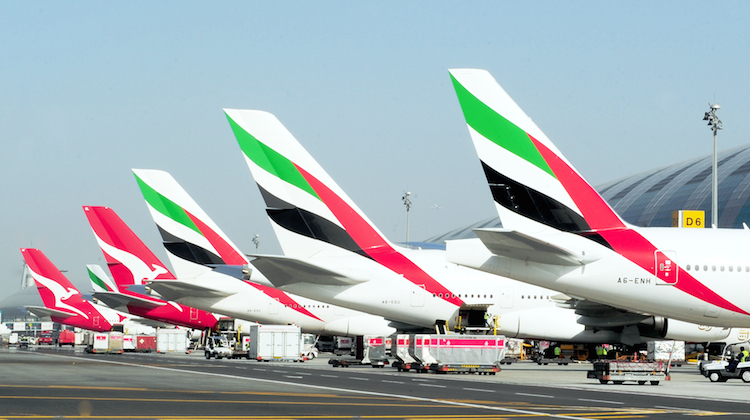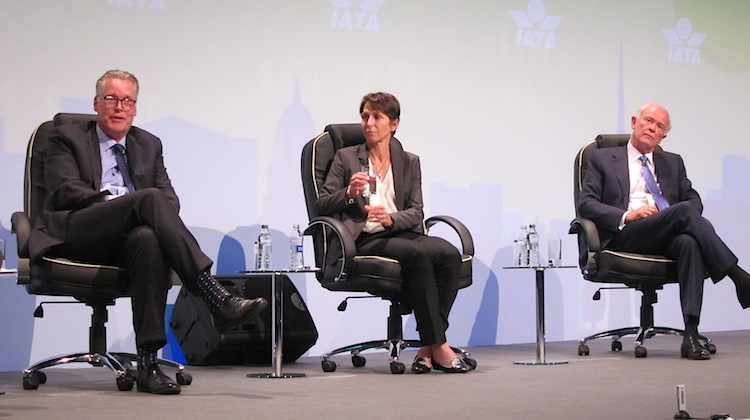
Emirates president Sir Tim Clark says his airline is currently more focused on adding extra capacity on its existing Oceania routes operated in conjunction with alliance partner Qantas rather than establishing new services to secondary cities.
The Dubai-headquartered carrier serves five Australia points with its own metal – Adelaide, Brisbane, Melbourne, Perth and Sydney – as well as Auckland and Christchurch in New Zealand.
Although Clark raised the prospect of opening flights to the likes of Alice Springs, Broome, Cairns and Darwin, according to a October 2015 report on Gulf News, the veteran aviation executive took a more cautious tone when speaking to reporters on the sidelines of the International Air Transport Association (IATA) annual general meeting in Dublin on Thursday.
“We have a major link with Qantas to serve multiple smaller cities and that is what we will do. We will continue to grow that,” Clark said.
“At the moment we are satisfied with what we’ve got.”
Under an expanded air services agreement signed in November 2015, Dubai-based Emirates has an allocation of 105 services to Australia each week to the four major gateways of Brisbane, Melbourne, Perth and Sydney, an increase of seven from the previous agreement.
Meanwhile, Abu Dhabi-based Etihad also received seven additional frequencies to Australia’s four largest airports, lifting its cap to 56 flights a week.
Currently, Emirates has 77 flights a week from its Dubai hub to Australia, with a number of services stopping via Asian points Singapore, Kuala Lumpur or Bangkok. The airline also has 28 flights a week between Australia and New Zealand.
It recently added new capacity into Oceania with the start of nonstop services to Auckland from Dubai with Boeing 777-200LR equipment, claiming the mantle of the world’s longest passenger flight.
In perhaps an encouraging sign regarding the ultra long haul route’s performance, Clark said Emirates planned to upgauge the aircraft to an Airbus A380 by the end of 2016.
“We can load more capacity onto the existing points,” Clark said.
“We have switched over Auckland to nonstop. That will be an A380 coming up in December so there is growth there.”

Meanwhile, Clark said a decision from Great Britain voters to leave the European Union would hit his airline’s operations in Europe hard and also impact other carriers.
Britons are due to vote decide on whether to remain in the 28-member economic and polical grouping in a June 23 referendum.
“It would temporarily, I hope, flatline demand as people think ‘how is this going to affect me’,” Clark said.
“If the Brits decide to exit the European Union, the shockwaves throughout the European Union, as it stands today, will be pretty severe in my view.”
“For somebody who is running a business that has very, very high demand in our European countries and cities, to see destabilisation wouldn’t serve any purpose at all.
“I would say 30 to 40 per cent of everything we do comes out of Europe.”
The uncertainty surrounding the UK’s decision on the European Union comes on top of the recent terrorist attacks in Paris and Brussels, alongside the unfolding humanitarian crisis on the continent due to the conflict in Syria.
Meanwhile, airlines have been forced to deal with rolling strikes from French air traffic controllers that has caused flight delays and cancelled services.
All of this has left the consumer feeling uncertain and more likely to stay at home.
“We’ve got political changes, we’ve got environmental changes, we’ve got economic changes, we’ve got socioeconomic changes, we’ve got geopolitical changes visible to all of us. Brexit would just add to that,” Clark said.
“At the moment the consumer, the man in the street, the woman in the street, is kind of a little bit upset. Not upset but they are waiting to see what would happen.
“If Brexit comes along we would see another shockwave coming through.
“I would like personally to think sense will prevail and the destabilising effect wouldn’t happen.”




